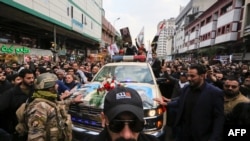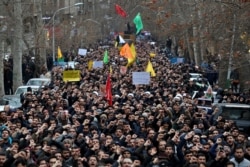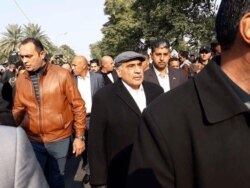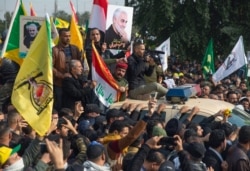Tens of thousands of people took to the streets of Baghdad Saturday to mourn the deaths of Iran's military chief and Iraqi military leaders, who were killed in a U.S. airstrike that has significantly increased tensions in the volatile Middle East region.
Iraqi Prime Minister Adel Abdul Mahdi joined marchers in a funeral procession, many of whom chanted slogans such as "Death to America" and "America is the Great Satan."
Also among the mourners were many men dressed in black military fatigues that were fiercely loyal to General Qassem Soleimani, the leader of Iran’s elite Quds Force, who was killed in a Friday airstrike at Baghdad's airport.
After being transported Saturday to the Iranian province of Khuzestan, Soleimani's body will be taken Sunday to Iran's holy Shi'ite city of Mashhad and then to Tehran before he is buried Tuesday in his hometown of Kerman.
Also Saturday, the White House formally notified Congress of Friday's drone strike, two senior congressional aides told Reuters. Under the War Powers Act, the notification is required within 48 hours of introducing U.S. forces into an armed conflict that could lead to war.
The document, which is classified, was sent to congressional leadership, the aides said. It would likely describe the Trump administration's justifications for the strike against Soleimani, as well as intelligence information behind the decision and the expected scope of the military involvement. It was not known if the information would be released to the public.
Many Democrats in Congress have criticized the strike, saying President Donald Trump failed to notify lawmakers ahead of time or seek approval for the attack.
The White House did not respond to media requests for comment.
Soleimani's background
Soleimani, 62, Iran's most distinguished military commander who was the architect of Iran's growing influence in the Middle East.
The U.S. killing of Soleimani has forced Washington and its allies in the region, primarily Israel and Saudi Arabia, into uncharted territory on how to confront Iran and its proxy militia groups throughout the region.
NATO, which has been training Iraqi security forces on how to prevent the Islamic State militant group from regaining strength, has suspended its training missions in Iraq.
NATO spokesman Dylan White said in a statement Saturday "The safety of our personnel in Iraq is paramount" without specifying why the training activities were suspended.
Amid escalating tensions in the region, the Pentagon said more than 3,500 additional U.S. troops would be dispatched to Kuwait, joining 14,000 U.S. troops already in the region.
On Saturday, hundreds of soldiers from Fort Bragg, North Carolina, filed into planes and deployed to Kuwait. Video released by the Army showed soldiers filing into planes, while Humvees were seen being loaded and chained in place, according to an Associated Press report.
U.S. coalition forces said two attacks also occurred Saturday, near the U.S. Embassy compound in Baghdad and near Balad Air Base. Both U.S. and Iraqi military officials confirmed the attacks but said no troops were injured. Security sources told AFP the attacks were a possible retaliatory response to rising tensions in the region.
Trump comments
U.S. President Donald Trump touted the killing of Soleimani late Friday, saying it was long overdue.
Speaking publicly for the first time since U.S. defense officials confirmed Soleimani was killed, Trump also warned Iran it risked more strikes if it continues to target Americans.
“We took action last night to stop a war,” Trump said at his home in Mar-a-Lago, Florida. “However, the Iranian regime’s aggression in the region, including the use of proxy fighters to destabilize its neighbors must end and it must end now.”
On Saturday, he tweeted that the United States had identified 52 sites in Iran that it would strike "very fast and very hard" should Iran attack any U.S. personnel or assets.
Trump maintained Soleimani was responsible for the deaths of thousands of Americans, Iraqis and Iranians, saying the long-time regime general “made the death of innocent people his sick passion” while helping to run a terror network that reached across the Middle East to Europe and the Americas.
Iraqi officials said another airstrike early Saturday hit a convoy of Iraq's Hashed al-Shaabi paramilitary network, killing at least five people. Iraqi state media blamed the strike on the U.S., which has not confirmed the attack.
The Iraqi military said in a statement that a rocket landed late Saturday in Baghdad's heavily protected Green Zone near the U.S. Embassy, another hit the nearby Jadriya community and two more rockets struck the Balad air base that houses U.S. troops north of the city . No one was killed and there was no immediate claim of responsibility.
U.S. officials have yet to provide details about the attack that killed Soleimani and Abu Mahdi al-Muhandis, the deputy commander of Iranian-backed Iraqi militias known as the Popular Mobilization Forces.
But White House national security adviser Robert O’Brien told reporters late Friday that Soleimani’s travel plans played a role in the timing of the airstrike.
O’Brien said Soleimani had just come from Damascus where he was planning attacks on U.S. military personnel diplomats.
U.S. Democratic lawmakers have demanded more information about the airstrike, which was carried out without consulting Congress, and before Trump's expected impeachment trial in the Senated later this month.
Democrats question whether the attack was intended to deflect attention from the trial and whether it was legal.
House Speaker Nancy Pelosi, a Democrat, said in a statement Friday that the attack took place without congressional authorization and "without the consultation of Congress," two requirements to ensure national security.










